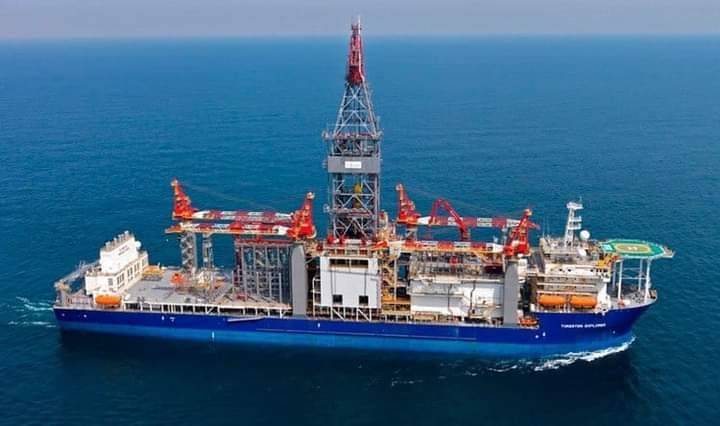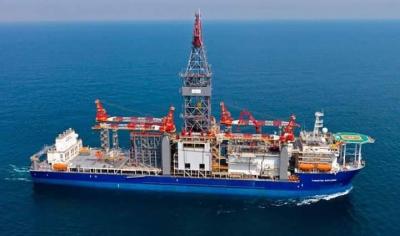Lebanon is exploring several options regarding the southern maritime border demarcation file, just days before the arrival of U.S. mediator Amos Hochstein in Beirut. These options include forming a technical delegation for negotiations expected to resume after the recent stalemate, alongside the opening of a second licensing round for offshore blocks that have not yet been awarded. This comes with the exclusion of submitting to the United Nations a decree to amend border point "29," in order to avoid further escalation that could prevent Lebanon from exploring for energy in its territorial waters. Lebanese President Michel Aoun confirmed that “the handling of the southern maritime border demarcation file stems from preserving Lebanon's interests and rights in its waters and land, and this file, which falls under international negotiations, is inherently the responsibility of the President based on Article 52 of the Constitution.” He added: “We will ask Hochstein to resume his efforts to reactivate the indirect negotiations, especially since Lebanon wants through these negotiations to be able to invest its oil and gas wealth in Lebanese waters and to maintain stability and security in the border region.”
An internal debate ignited following the docking of a vessel searching for gas in Israeli territorial waters last Saturday, concerning Lebanon's submission to the United Nations of an amended decree for the maritime boundary that it claims as its right, known as "point 29." This follows Lebanon having submitted to the UN in 2010 the boundary point "number 23," effectively increasing the disputed area from 860 kilometers to 2,290 kilometers. President Michel Aoun rejects signing the amended decree numbered 6433.
The head of the "Free Patriotic Movement," Deputy Gebran Bassil, hinted at signing the decree if negotiations expected to be resumed after Hochstein's visit on Sunday fail. He stated, “It is not enough for the ship to be south of line 29 as long as it is above Karish. It is also insufficient for Israel to claim it will extract gas from the uncontested area, as the field is one.” He added, “Now is the opportunity for a solution before Lebanon officially submits line 29, turning it from a negotiable to a legal matter. Now is the time to impose the equation; no gas from Karish without gas from Qana,” referencing a neighboring border field to the south.
Lebanon has informed the United Nations that its borders end at point 23, but the negotiating delegation proposed point 29 as a negotiating line, indicating that there are two lines. Israel has avoided exploring in the disputed area between lines “1” and “23,” and Lebanese sources reiterated that the "Energean" ship docked south of line 29 in an attempt to avoid confrontation. However, Lebanese estimates suggest that there are shared fields on the border, which threatens Israel potentially extracting gas from Lebanese waters.
Lebanon is hesitating to sign the amended decree, threatening to halt negotiations entirely. Sources following the demarcation file since 2007 indicated that Lebanese options are narrow, stating: “There are serious concerns about a stalemate that could nullify negotiation opportunities, resulting in Israel producing gas while Lebanon is unable to explore,” referring to obstacles faced in exploration in Block 9 amidst the dispute, despite it being awarded to a consortium of three French, Italian, and Russian companies.
The sources added: “Signing the decree and the halt of negotiations combined with Israel's insistence on extracting from an area it considers disputed threatens a military conflict that is difficult to avoid.” Hezbollah claims to abide by the decision of the Lebanese state and operates within its limits; note that it had threatened last month to resort to military options to prevent Israel from extracting energy if it was barred from exploring in its waters.
Lebanon is counting on Hochstein's visit to resume efforts and reach a solution that avoids military tension in the region. Lebanese sources following the recent activity expect the resumption of negotiations and an eventual agreement, noting that “several proposals have been put on the table, including forming a new technical delegation to negotiate, amidst an unresolved question about which authority will oversee and coordinate negotiations if the recent negotiation mechanism (the shuttle diplomacy conducted by Hochstein between Lebanon and Israel) is replaced, or if the previous dynamic (indirect negotiations under the auspices and supervision of the UN with American mediation) is resumed, with indications that the President will likely assume the negotiating role based on the Lebanese Constitution.”
Simultaneously, Lebanon is looking at other options, underscoring the need to proceed to avoid wasting time that has been squandered over the past two years, according to the sources. These options involve opening a second licensing round for other offshore blocks for investment, to avoid wasting time until the maritime border negotiations with Israel conclude. The sources stated: “The priority today is to start exploring and extracting energy, as Israel is doing in other fields far from the Lebanese border, while simultaneously adhering to Lebanese rights and not compromising them within the framework of the agreement established since October 2020.”
Lebanon proposed two offshore blocks for investment in 2017, which were awarded to a consortium of three companies: the French “Total,” the Italian “Eni,” and the Russian “Novatek.” Exploration commenced in the spring of 2020 in Block 4, but it turned out that the quantities available did not correspond to a large-scale investment approach, while exploration in Block 9 along the southern border has not yet begun, despite the planned drilling point being 25 kilometers north of the disputed border area with Israel.
The sources believe that Lebanon made a strategic mistake in pushing to begin exploration in Block 4. They added: “If Lebanon had insisted on commencing exploration in Block 9, it would have established a reality of exploration to the south, as Israel did in the Karish field opposite the southern Lebanese border.”




